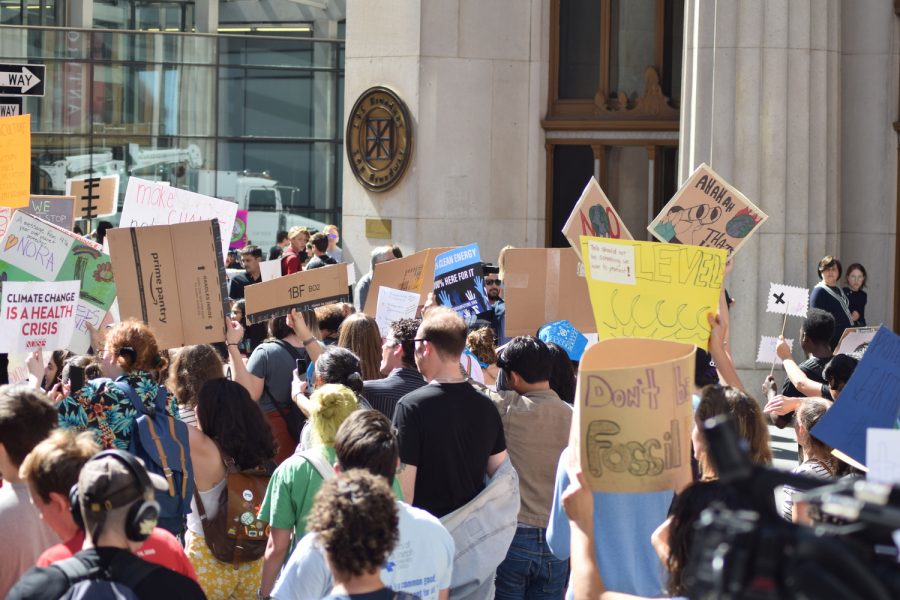The Global Water Shortage Still Persists, and It’s Getting Worse
India is currently in a major water crisis and twenty-one major cities are predicted to run dry by 2020.
Students demonstrate at the New York City climate strike led by Greta Thunberg on September 20th, 2019.
2020 is fast approaching, and with it comes impending doom for millions of people as their clean water runs out. A global water crisis, especially prevalent in the Middle East, is on the rise as the effects of climate change become more widespread. Countries such as India, Pakistan, Saudi Arabia, and Iran will soon become dry and barren — a future that few want to acknowledge.
Clean water shortages are frequent around the world. In theory, there should be no water shortage as supplies of groundwater, the water held in soils or pores in underground rocks, commonly accessed by wells, should still be overflowing with water. Under the dirt, sand, and clay, there are layers called aquifers. These layers trap water which can be accessed by wells. Bodies of water supply the underground aquifers with sanitary water. Many rural agricultural towns and cities that are centered away from damp areas have overused well water, leaving the aquifer dry from overuse and unable to steadily replenish.
Take the case of Uttar Pradesh, a Northern Indian state, where the groundwater was the people’s main source of water. To improve the system, the Indian government wanted to set up an electric-powered pump system for groundwater extraction, deciding to work with donors to improve electrical access and the tube program. Unfortunately, this was slow and unreliable for small-scale farmers, leading the untrained farmers to create their own private wells and groundwater systems, effective but damaging. Most farmers were inexperienced in correct use of their water, consistently overusing water with farming tactics such as flooding, increasing their agricultural development. Use of such tactics depleted the available groundwater swiftly, causing farmers to dig their wells deeper to compensate. This does not seem that bad until you realize that over two million private wells are luring up this groundwater, diminishing the country’s supply.
Despite its apparent localized influence, the water crisis affects everyone — and people aren’t realizing it. “Even though some awareness is spread, everyone likes to just sit and wait for someone to save the day because it isn’t affecting them directly,” said Geena Yeo ’22.
Global warming is a common topic of discussion in today’s political climate, but the extent to which it is affecting some countries is far from being properly addressed.Warmer temperatures have increased the rate of evaporation, creating an imbalance with the delicate water cycle. As the rate of evaporation increases, the amount of water the atmosphere can hold also increases. But it’s not too late to take action.. “If we start now, we might be able to salvage the problems we have already caused… It’s like we’re learning about a new issue stemming from global warming every day now!” said Jacob Ko ’22.
“Even though some awareness is spread, everyone likes to just sit and wait for someone to save the day because it isn’t affecting them directly,” said Geena Yeo ’22.
Nevertheless, there are many nonprofits helping those suffering from water crises, including Water.org, Splash, Plant Water Foundation, and Ride4Water. These charities strive to protect and provide freshwater and care for those without access to forms of sanitation or natural sources. They are working to assist the people who do not have the privilege of having their basic needs served towards them appetizingly. They work on global missions to make sure everyone has freshwater for consumption and cleaning and aim to bring water systems to a greater number of people. These projects can only do so much — the current problem is too vast for only charities to handle. As Romona Ling ’22 said, “if not all of the variables are addressed and fixed, the problem may continue, leaving efforts wasted.”
Sophie Livingstone is an Editor-in-Chief for ‘The Science Survey.’ She enjoys both journalistic and creative writing and the influence that one can...

